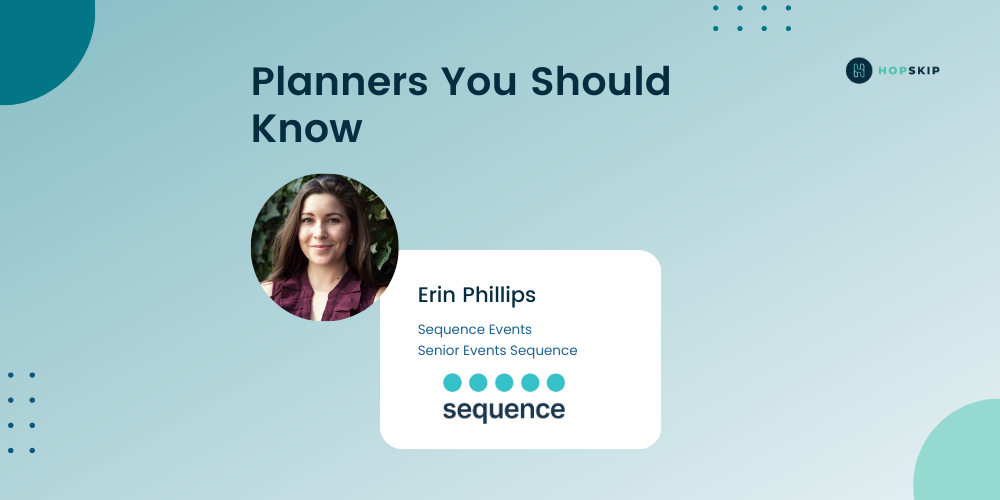Planners You Should Know - Erin Phillips, Sequence Events
Erin Phillips, of Sequence Events, discusses how she honed her skills over the pandemic to now be in position to overcome the challenges that the new meetings/events landscape brings.
This post is part of the HopSkip Planner Spotlight Series where HopSkip spotlights planners across the industry to bring awareness of how they adapted to COVID-19, communicating and lessons learned and sharing how they are viewing the meetings and events industry in a post-pandemic world.
Name: Erin Phillips
Company Name: Sequence Events
Job Title: Senior Events Producer
Years of Experience: 10
How did you get your start in the events industry? What made you pursue this role?
My path to events was a non-linear one! I was working in disaster relief for the American Red Cross in their Mass Care unit – we provided food, shelter, and basic necessities to those impacted by fires, floods, hurricanes, and other disasters impacting the US. As I thought next about my career, I felt if I could handle an actual disaster, then the stressful world of events might be a good fit!
How do you compare planning your first in-person event post-pandemic, to planning meetings/events pre- Covid? What was different and unique? What was similar?
Our attendees became used to the model of virtual events – they happened on a much shorter timeline, budgets were tighter, content and presentations became shorter. Alternatively, we were seeing commitment, participation, and attention span drop drastically. Attrition used to be very stable around 15-20%, and today we are seeing anywhere from 30-50% drop-off - which completely changes how we are preparing in an unpredictable environment.
What was your number one challenge in hosting your first in-person event(s) and how did you overcome it?
The challenges today come in many different forms, events have always been tied to the market around us – events are a luxury, not a necessity. But today we’re really feeling the impact of the world around us. Not only is there a public health endemic directly impacting and exposing large groups of people, but there are also staffing shortages, supply chain shortages, record-high inflation, an impending recession, and a very large remote workforce. Across the board, we’ve had to remain creative, flexible, and realize that everything can change in a matter of minutes – but that’s why you hire an events agency, to deal with the curveballs and find solutions that work for your attendees!
What is the top learning that you uncovered from the last two years that you’re implementing in your planning process today? (any other tips or tricks you want to share?)
Contingency planning has been key – remember when a rain plan was the biggest concern?? We’re going into every project with a Plan B, C, D, and even E – it spans from 50% attrition to testing protocols, to what happens if speakers 1-4 aren’t able to attend. I’ll also say that at this specific moment in time, we’ve gone back to basics, the events are smaller, and the focus remains on building and expanding relationships – we’ve dropped the thousand-person conferences for more intimate and high-impact conversations. There’s no more pre-party, after-party, and nightly concerts – we’re having real connections in a smaller environment. It’s the same amount of work for us, but it’s refreshing to see our attendees interact in this new way.
With hotels short-staffed, and RFP lead time shortening, what is your advice to other planners to overcome these obstacles when requesting hotels for proposals?
Be persistent, trust the hotel that has the better response time, and don't be too shy to pick up the phone and call.
Are you approaching contracting with hotels differently, post-pandemic?
Yes and no! We’re keeping a close eye on guarantee numbers, but the more interesting thing is that the top conference markets are shifting to accommodate a large remote workforce and ever-changing flight patterns.
What is the biggest area of improvement that you think hotels can make when either responding to your RFPs or during the contract phase of your event?
Response time is key – even if a “sorry we’re booked on these dates or have XYZ open” helps us. Plus, we’re always open to seeing or learning about sister properties in the portfolio! Helping us to schedule a site visit with all members of your team or property is also a huge help, the banquet team, AV partner, and any local DMC’s.
Due to the pandemic, our events community had to evolve, adapt, and grow. Many planners started to embrace new technologies as a result of the pandemic. What new tech are you using today in your planning process as a result?
Nothing new, but it's been a game changer having collaborative documents with our clients. Shared folders and collaboration are at an all-time high!
Since education and relationships are two major pillars in the meetings and events industry, any suggestions on how other planners can learn and network with their peers across the industry?
I personally love keeping an eye on BizBash and other event industry platforms to see what’s trending. As with most of what we do its about seeing what others are doing around us, and talking to your vendors and partners to see what other industries and groups are doing. Attend as many local and national events as you can to see how trends are changing.
This post is part of the HopSkip Planner Spotlight Series where HopSkip spotlights planners across the industry to bring awareness of how they adapted to COVID-19, communicating and lessons learned and sharing how they are viewing the meetings and events industry in a post-pandemic world.
